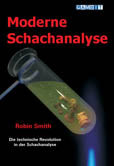
Smith: Modern Chess Analysis
Autor: Smith, Robin
Verlag: gambit
Erscheinungsjahr: 2005
Sprache: German
Buchumschlag: book
Seiten: 192
" Computers are incredibly fast, precise and stupid; humans are incredibly slow, inaccurate and brilliant; together they have unimaginable possibilities. " - Attributed to Albert Einstein.
Chess analysis is almost as old as the game itself. Many pioneering works by the greats of chess history are devoted to the analysis of positions, openings and endgames. Chess analysis, chess theory and chess knowledge have progressed ever since; the analysts built on the knowledge of previous generations and their methods have actually changed little since this early period of chess.
At least until recently. Modern PCs and powerful chess software have had a significant impact on chess analysis and chess theory. Today, you will hardly find a GM who works without a computer. And yet this is the first book to address the question of how best to combine the computer and the human brain for the purpose of chess analysis - a very central question in modern chess.
But the book goes far beyond simply explaining methods of computer-aided analysis. As readers work through the examples presented by Robin Smith, they will develop a deeper understanding of the capabilities and limitations of the human mind, as well as a greater understanding of many areas of the game of chess.
The following topics are covered in this versatile book: Schematic thinking; Dynamic play and quiet maneuvering; Fortresses; King hunting and "King's Drift"; The problem of exchanges; Interactive analysis.
Robin Smith is about to be officially named a correspondence chess grandmaster. He is a two-time US correspondence chess champion and has won a semifinal tournament in the World Correspondence Chess Championship.
"The strengths and weaknesses of chess programs are systematically researched and organized using many positions from top-level chess. The book is full of original insights and tips. Ingenious reading for chess fans who consult their PC when analyzing, and compulsory reading for correspondence chess players and programmers, and anyone who wants to win against computers." - Dr Erik Rausch, Rochade
" Modern Chess Analysis is well written, Robin Smith is very familiar with the subject matter and the topic is very interesting for anyone who uses computer software for chess analysis. This makes it a clear purchase recommendation for the target group." - Thomas Schian, Rochade
"In addition to a detailed discussion of the diverse and interesting topics, which has probably not been undertaken in this way and depth by any other author, the book also offers many impressive examples. This book is certainly not only recommended for correspondence chess fans, because for most chess players there is no way around Fritz & Co." - Schachmarkt
"...the book even offers an excellent price-performance ratio, because the good presentation, the originality and the concrete benefits that the work conveys to the reader, justify this price without reservation. Anyone who wants to find out more about computer chess or further their education will warmly recommend this book. It is also ideal as a gift or prize!" - Heinz Brunthaler, Rochade
"Rating: highly recommended! The best computer chess book I have read in a long time." - Helmut Conrady
"Astonishing. Amazing. Excellent. Exceptional. Phenomenal. Rewarding. Breathtaking. Overwhelming. Surprising. That's what my thesaurus says about Modern Chess Analysis . Oh yes, and I almost forgot - powerful, dangerous, difficult and arduous. ... If you plan to play international correspondence chess at a higher level, buy this book!" - Alex Dunne , ICCF Amici ( www.amici.iccf )
" Modern Chess Analysis is an indispensable guide to the effective use of computers for chess analysis." - Frederic Friedel , Chessbase.com
"When recommending a book, I have to consider Chess Today 's wide readership from top grandmasters to club players. I believe all readers would benefit from reading this book. All top players use computers, but many do not have a deep understanding of how the process works, and increasing this knowledge allows for deeper evaluations and avoids pitfalls that can cost important points. For similar reasons, club players can use their increased knowledge to sharpen their analytical skills and hopefully continue to improve. I highly recommend this book as the subject matter and the author's knowledge and communication skills make it an essential read for today's chess players." - Andy Ansel, Chess Today
"In summary, the use of computers has become a subject of interest to most chess players, and this book does its job of explaining how the serious chess player can make the most of that use better than any other. Practical tips abound, and any player interested in purchasing a computer for chess-related study will benefit from the introduction alone. In short, if you plan to use your computer for high-level chess study, you will need this book." - Randy Bauer, www.jeremysilman.com
"This book tells you how to do your own analysis using the best tools available today. There are so many analysis methods and examples presented that it is impossible for one reviewer to comment on them all. The emphasis is on understanding these methods, and Smith has taken great pains to ensure that the book will remain a valuable reference for a long time to come, even though the details of chess programs are sure to change at a rapid pace. Modern Chess Analysis is highly recommended as a major reference for anyone involved in chess analysis." - Stacy Angle, Chess Horizons
"This book is an absolute must for anyone who uses computers in chess analysis. Whether you use computers for game analysis of your own games, for studying GM games, or for correspondence chess, you will get your money's worth. If you are fascinated by computers, you will probably be happy even if you do not analyze seriously with a silicon assistant. Players over 1800 will probably learn something from the pure chess analysis in this book, even if they have no interest in computers at all." - Michael Mulford, Georgia Chess
Leseprobe
Sichere Zahlungsoptionen bei uns im Shop
-
Versand mit DHL und DPD
-
Versandkostenfrei in DE ab €50
-
14 Tage Rückgaberecht












